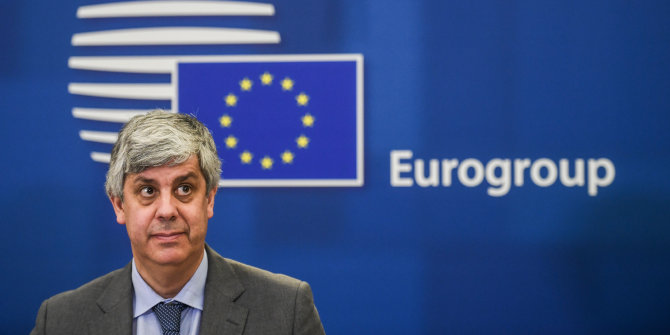 If Britain ever sought to rejoin the EU, it could not be on the terms of membership the country previously enjoyed, warns Iain Begg. The UK’s budget rebate, exemption from Schengen and opt-outs from the euro and judicial cooperation will not be on the table again. This would make rejoining a difficult sell to the British public.
If Britain ever sought to rejoin the EU, it could not be on the terms of membership the country previously enjoyed, warns Iain Begg. The UK’s budget rebate, exemption from Schengen and opt-outs from the euro and judicial cooperation will not be on the table again. This would make rejoining a difficult sell to the British public.
A curiosity of the Brexit saga has been the steadfast belief in the sanctity of the referendum result. Despite the ambiguous constitutional status of referenda in the UK and the narrowness of the vote, the main political parties fall over each other to “respect the verdict of the people”. Individual Members of Parliament are too worried about upsetting their constituents to insist that the principle of representative democracy should give them the final say.
Many Remainers cling to the hope that it will all prove to be disastrous, the country will return to its senses, and seek to rejoin the EU sooner rather than later. However, one dimension of this scenario has received surprisingly little attention: the terms of membership the UK currently has are very unlikely to be on offer in future.

Credit: hehaden (CC-BY-NC 2.0 licence)
First, the opt-out from the euro will no longer apply, with the best the UK can hope for being to emulate Sweden – legally “in derogation” of its obligation to accede, rather than having an opt-out as the UK and Denmark do – by making no effort to join. In practice, this could be enough to enable the UK to retain the pound indefinitely, but if (and it is far from implausible) other countries accede to the euro following Brexit, leaving only one or two Member States outside, the position would be harder to sustain.
Moreover, the euro will not stand still. The Germans and the French struggle to agree on what the priorities are for strengthening the governance of the Eurozone, but it is the sequencing of the various reforms more than what needs ultimately to be done that is at issue. Within a few years, a closer banking union (which the UK has not been part of) will be in place. Bank supervision has already been assigned to the European Central Bank for the largest Eurozone banks, and there is now a common bank resolution procedure. The next phase will very probably include some form of common deposit insurance and the establishment of a European Monetary Fund.
Eurozone deepening will also include additional budgetary capacities aimed at macroeconomic stabilisation – meaning automatic cross-border fiscal transfers – and the possibility of a common bond equivalent to the US Treasury Bond. Although resistance from creditor states has stalled these developments and is likely to mean only small funds in the first instance, the direction of travel is set. Ironically, it is a direction British ministers regularly advocated during the years of the euro crisis.
Despite the current difficulties in arriving at a coherent EU approach to asylum seekers and economic migrants, a common policy will eventually be agreed. Together with moves to establish a much enhanced EU border force, the EU’s commitment to the Schengen free movement area is more likely to be strengthened than weakened. The difficulties over the Irish border in the withdrawal negotiations have focused mainly on the issue of border controls on goods. But for free movement of people once the UK is outside the EU, there is an open question about how the free movement area in the British Isles interacts with the Schengen free movement area. Were the UK to seek to rejoin the EU, bringing both Ireland and the UK into Schengen would inevitably be on the table.
Then there is the EU budget, so prominent in the referendum campaign because of the dishonest claims about a bonanza for the NHS. One of the reasons the £350 million per week figure was undeniably an exaggeration is that it did not take account of the rebate conceded to the UK in 1984 after a sustained hand-bagging by Margaret Thatcher. Rebates have since proliferated, but their lynchpin was always the UK one which, unlike the time-limited nature of all the others, could only be removed if the UK agreed. The European Commission’s proposals for the next seven-year budgetary cycle include a progressive withering away of rebates, making it probable that they will have been consigned to history by the time the UK might consider re-applying to the EU.
In the interim, the uneven pattern of EU spending which gave rise to demands for rebates may also have been reformed, notably spending on payments to farmers. However, there will still be net contributors to the budget and, without the formal mechanism of the rebate, future UK payments into the UK would be higher than at present, rising to the shares of GDP currently paid by others, such as the Germans and the Dutch. The UK also has various other, less high-profile, exemptions and opt-outs in areas such as judicial cooperation, and has been reluctant to grant real foreign policy powers to the EU. More extensive collaboration on defence is also on the cards.
As Neil Sedaka put it in his song, “breakin’ up is hard to do”, but the lyrics go on to plead “instead of breaking up I wish that we were making up again”. Yet imagine the headlines in the more hostile British newspapers if rejoining the EU meant accepting the euro, being part of Schengen, foregoing the rebate and, generally, adopting those EU rules and practices from which the UK has been granted exemptions.
For Remainers, the conclusions to draw are twofold. First, even if the country rapidly regrets its decision, there will be no going back to the deal the UK currently has. Second, returning to the EU on terms less palatable to UK voters will be hard to sell to them, rendering a future decision to rejoin politically implausible. For Leavers, the conclusion is much simpler: however much they object to elements of the withdrawal deal or proposals for the future relationship, they will be worth swallowing for now because the bigger prize of leaving the EU will be all but irreversible. The cannier pro-Brexit members of the Cabinet seem to have grasped this.
Of late, all the attention has been on “Chequers”, “no-deal” and the various “Canada” plus or minus options. There is just about enough time left to add “future deal” to the list.
Please read our comments policy before commenting.
Note: This article originally appeared at our sister site, LSE Brexit. It gives the views of the author, not the position of EUROPP – European Politics and Policy or the London School of Economics.
_________________________________
 Iain Begg – LSE
Iain Begg – LSE
Iain Begg is Professorial Research Fellow at the European Institute and Co-Director of the Dahrendorf Forum, London School of Economics and Political Science.





It is interesting that it is only now that someone is talking about the great deal the UK has with the EU. I am sure this it not new but it has not been news up to now..
Personally I would love if the UK decided to reverse the decision and become more European.
Sadly it is highly unlikely.
Things like opt-outs from Schengen and the Euro are not important to the younger generation that will bring us back into the EU in 20 years. I am 37 and would be happy to be rid of the pound, and every other wretched totem of little englander jingoism that the Brexit-voting older generations cling to.
i would welcome a chance to rejoin europe fullyintergrated as this time we would be embracing the concept of being true europeans and would give us more clout at future negotiations at the table.i do beleive man is stronger together.As we leave europe there should be a date set to have a referendum on wether or not to rejoin again.
Aren’t there also EU rules that mean a country that leaves cannot reapply for 49 years?
Just as the first comments confirm, there is little to understand from the crass slogans and catch phrases which describe the ‘bigger prize” of leaving te EU. What is it ? I find only disbenefits; a slowing of the economy by 3% or more, raised costs of food and in my personal terms I will lose my existing right to travel freely and to stay anywhere in the EU and the right of reciprocal health care. I am 73 years old an I trust my contemporaries who are ageing Brexit voters will be surpassed by the young contributors and their cohort and we will rejoin in not too much.time.
As an ardent Brexiteer I now believe the we should re-join eec and make the common market stronger and more powerful. Get rid of Schengen and I would vote to re-join as would many others.
If there was a vote to rejoin the EU, it would have to be rigged. If horror upon horrors we voted to still stay out of the EU, the remainers would want another and another until the result is remain, incidentally it would be interesting to see if the result was go back to the EU, when would the next referendum about the possibility of exiting be, 10 years? My guess, never, once we are back in the EU, we will stay there permanently.
If there was another referendum it would have to be rigged because what if, horror of horrors, it was the same result, the remainers would want another and another vote until we got the rejoin vote and incidentally if the result was rejoin, what would happen next, would there be another referendum in ten years. I would guess it would be the end and it would stay at remain for good.